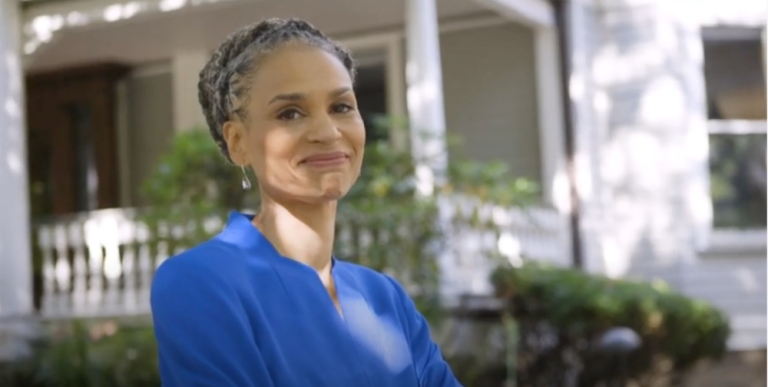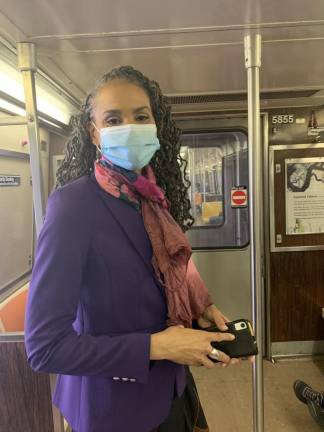‘I Am Not a Conventional Candidate’
Maya Wiley, civil rights attorney and former counsel to Bill de Blasio, announces her run for mayor


From the steps of the Brooklyn Museum last week, Maya Wiley began laying important groundwork for her campaign for mayor of New York City, including distancing herself as much as possible from her former boss, Bill de Blasio.
In announcing her candidacy, the civil rights attorney painted herself as a change from the status quo of New York politics. Wiley, who has never before run for elected office, said she is the choice for voters who are tired of “the same old thing.”
“Some will say I don’t sound like past mayors or look like them or think like them, and I say yes, I don’t — that is the point,” said Wiley, who, if elected, would make history as the city’s first woman mayor and its second Black mayor. “I am not a conventional candidate. But changing it up isn’t the risk. Electing the same kinds of people, bringing the same old broken promises over and over again and expecting things will be different — that’s the risk we can’t afford right now.”
Though Wiley has most recently gained recognition as a popular legal and political analyst on MSNBC, she does have some experience in city government, as Mayor de Blasio’s top lawyer. She then later briefly chaired the Civilian Complaint Review Board, which is tasked with monitoring misconduct in the NYPD. During her time on the CCRB, she said the charges she recommended the city bring against Daniel Pantaleo, the police officer who killed Eric Garner, was critical in that it led to Pantaleo’s eventual firing from the NYPD. If she had been the mayor at the time, Wiley said, she would have been quick to fire Pantaleo (who was dismissed five years after Garner’s death) and to end the state measure that kept police disciplinary records sealed from the public, which was ultimately taken off the books this summer.
“Agents of the City”
For many voters, though, Wiley’s association with de Blasio — who is incredibly unpopular at the moment — will be a stain on her candidacy. She will be asked to answer for her time in his administration, particularly in arguing to keep de Blasio’s email communications with outside consultants private as the advisers were “agents of the city.” Comptroller Scott Stringer invoked the term with disdain during his campaign launch last month, saying his administration would be a transparent one not beholden to special interests.
In her announcement speech, however, Wiley did not hold back in criticizing the mayor’s vexing run for president, as well as his recent comments saying he would not urge anyone to run for mayor of New York City right now.
“When I’m in charge, you will never have to question whether anyone is listening, whether the mayor even wants the job,” Wiley said. “You will never have to ask yourself whether you matter. You will never have to wonder whether I’m in Iowa.”
Her association with de Blasio may be a weakness, but Wiley has plenty of strengths — one being her talent as an orator. In recognizing the hardship and heartbreak of families across the city who have lost loved ones to the coronavirus, Wiley told her own personal story of tragedy and loss. When she and her brother were just 9 and 10 years old, the two watched their father, civil rights leader George Wiley, drown after falling overboard in the Chesapeake Bay. Wiley and her brother had to drive the boat back to shore and get help.
“That is survival. And that is what we must do now, as a city,” said Wiley. “To look each other in the eye, like my brother and I did, and fight our way back together, even with the tears streaming down our faces.”
Racial Justice and Housing
In the city’s recovery from the pandemic, Wiley said she would be the candidate that could bring New York back. She did not offer specific policy plans in her address, but she made it clear that racial justice and desegregating schools and housing would be a focal point of her tenure. Wiley was also critical of the administration’s handling of the current budget crisis, making cuts in education, transportation and housing while leaving the NYPD “virtually untouched.” Later, in an appearance on Brian Lehrer’s radio show, Wiley said she would invest in over-policed communities and shift some responsibilities tied to mental health calls and traffic enforcement away from the police.
So far, Wiley has received endorsements from Deputy Senate Majority Leader Michael Gianaris, Assemblymember Michael Brake, and City Council members Stephen Levin and Helen Rosenthal. She will need to figure out how to build a coalition in a race in which Stringer has already secured the backing of some of the city’s progressive stars, including state Senators Jessica Ramos, and Alessandra Biaggi and Assembly Member Yuh-Line Niou.
In the Democratic primary election next summer, Wiley will also face competition from a former city commissioner, retired Brigadier General Loree Sutton, and nonprofit CEO Dianne Morales. Brooklyn Borough President Eric Adams and Kathryn Garcia, the city’s sanitation commissioner, are also expected to announce campaigns for mayor.
Wiley seems up to the challenge.
“Over my time in government, I saw firsthand what is possible, how City Hall can lead to transform the city for the better — and I also saw how it fails,” said Wiley. “But I believe in my bones, to the very core, that if we open our hearts to one another, if we open our minds, and we take ourselves off the treadmill of incrementalism ... we can bring about the reimagination this moment demands.”
“Some will say I don’t sound like past mayors or look like them or think like them, and I say yes, I don’t — that is the point.” Mayoral candidate Maya Wiley